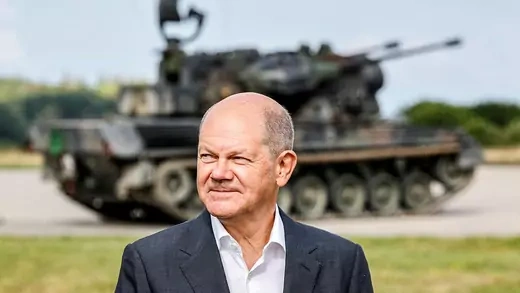In Brief
On the Ukraine War, Germany Has a Leadership Problem. Here’s Why.
Germany is providing critical weapon systems to Ukraine in the grinding war with Russia, but it remains reluctant to lead on European security.
In February, German Chancellor Olaf Scholz announced a Zeitenwende, or “turning of the times,” in response to Russia’s invasion of Ukraine. This initiated sweeping changes to Germany’s defense policy. Still, Berlin remains reluctant to send Ukraine certain heavy weapons, such as battle tanks, and should be doing more to take a leadership role on European security.
What military aid has Germany provided to Ukraine?
Since the end of January, the German government has committed €1.20 billion ($1.16 billion) in military aid to Ukraine, which includes weapons and equipment as well as financial aid with military purpose. In terms of absolute spending, Germany ranks ahead of France but behind both the United Kingdom and Poland.
More on:
Both the scope and quantity of Germany’s military support for Ukraine have expanded since the beginning of the war. Germany started by providing basic equipment, such as helmets, and it is now delivering heavy weapons including rocket launchers, self-propelled howitzers, anti-aircraft guns, armored personnel vehicles, and air defense systems. The first such system just arrived in Ukraine, while the remaining three are not expected to arrive until 2023 due to production limitations.
Production capacity is not the only impediment to Germany scaling up its support for Ukraine; political considerations have also slowed assistance. Berlin has expanded its military aid piecemeal, and only under domestic and international pressure. Therefore, despite its important military contributions to Ukraine, some of Germany’s eastern neighbors, such as Poland, still perceive it as a reluctant supporter, which is hurting its reputation in these countries.
What factors are shaping Germany’s assistance?
Given its political and economic heft, many Western allies expect Germany to assume a leadership position in Europe’s response to the war in Ukraine. However, fearing escalation with Russia, Berlin is hesitant to accept this role.
Disagreement among German policymakers on whether to provide Ukraine Leopard battle tanks exemplifies this tension. No Western country, including the United States, has delivered Western-made battle tanks to Ukraine, and Germany is hesitant to go it alone. The government has not taken up recommendations by experts and the European Parliament to lead a larger European initiative to provide Ukraine with Leopard tanks. Chancellor Scholz has repeatedly framed battle tank deliveries as an escalatory red line, yet the distinction from other, already delivered Western weaponry remains unclear.
The fear of escalation is a dominant factor in German policy considerations. Unlike Poland and the Baltic states, Germany does not perceive Russia as an immediate threat to its own security, but it is concerned about the risk of a wider confrontation between Russia and the North Atlantic Treaty Organization (NATO). Scholz considers his position on escalation to be in line with the Joe Biden administration’s policy. However, the United States has provided Ukraine with almost twice as much financial, humanitarian, and military aid as all European Union countries and institutions combined, and it has signaled that Germany should determine for itself whether to deliver battle tanks.
More on:
The three parties that comprise Germany’s governing coalition are divided on the question. Foreign Minister Annalena Baerbock’s Green party is in favor, as is the liberal Free Democratic Party of Finance Minister Christian Lindner. However, the Social Democratic Party–led Chancellery and the Federal Ministry of Defense, which hold the decision-making power on this matter, are more reluctant. Public opinion is also split.
How meaningful has the pivot been in Germany’s military and security?
Germany has redefined its energy and security policies, as well as its posture toward Russia.
The shift was an emergency measure in response to the invasion of Ukraine and broke with the country’s past policies of dialogue with Russia and only limited investments in its own security. Berlin has reduced its dependence on Russian gas and committed to a special fund of €100 billion($97.8 billion) to bring defense spending to 2 percent of gross domestic product (GDP)—a NATO benchmark—and to fill the gaps in the German army. Among other investments, Germany will acquire F-35 fighter jets from the United States and continue its participation in nuclear sharing, a commitment by Germany to transport U.S. nuclear weapons in the event of a nuclear attack.
Should Germany be doing more?
Despite its significant policy responses to Russia’s invasion of Ukraine, Germany is still not assuming a leadership role in European security. This erodes trust among its eastern neighbors and shirks Germany’s obligation, as Europe’s most powerful country, to project order and stability in the region. A joint decision by Germany and its European partners to deliver battle tanks to Ukraine would be a first step. Berlin should also make sure to maintain its current level of defense spending beyond the five-year period of the special fund, though ideally it would increase defense spending further. Beyond military support, Ukraine will need significant financial support to meet its budgetary needs in the coming months.
Given the country’s pacifist post–World War II tradition, it is impressive how far Germany has come on military matters. Nevertheless, it is still falling short of former Chancellor Angela Merkel’s call for Europe “to take our fate into our own hands.” So far, the United States is leading foreign aid efforts in Ukraine, and Europeans are leaning in. But it is not sufficient for Germany to be a reliable follower; it should strive to be the primus inter pares—the first among equals—in European security, and a partner in leadership with the United States.
 Online Store
Online Store
